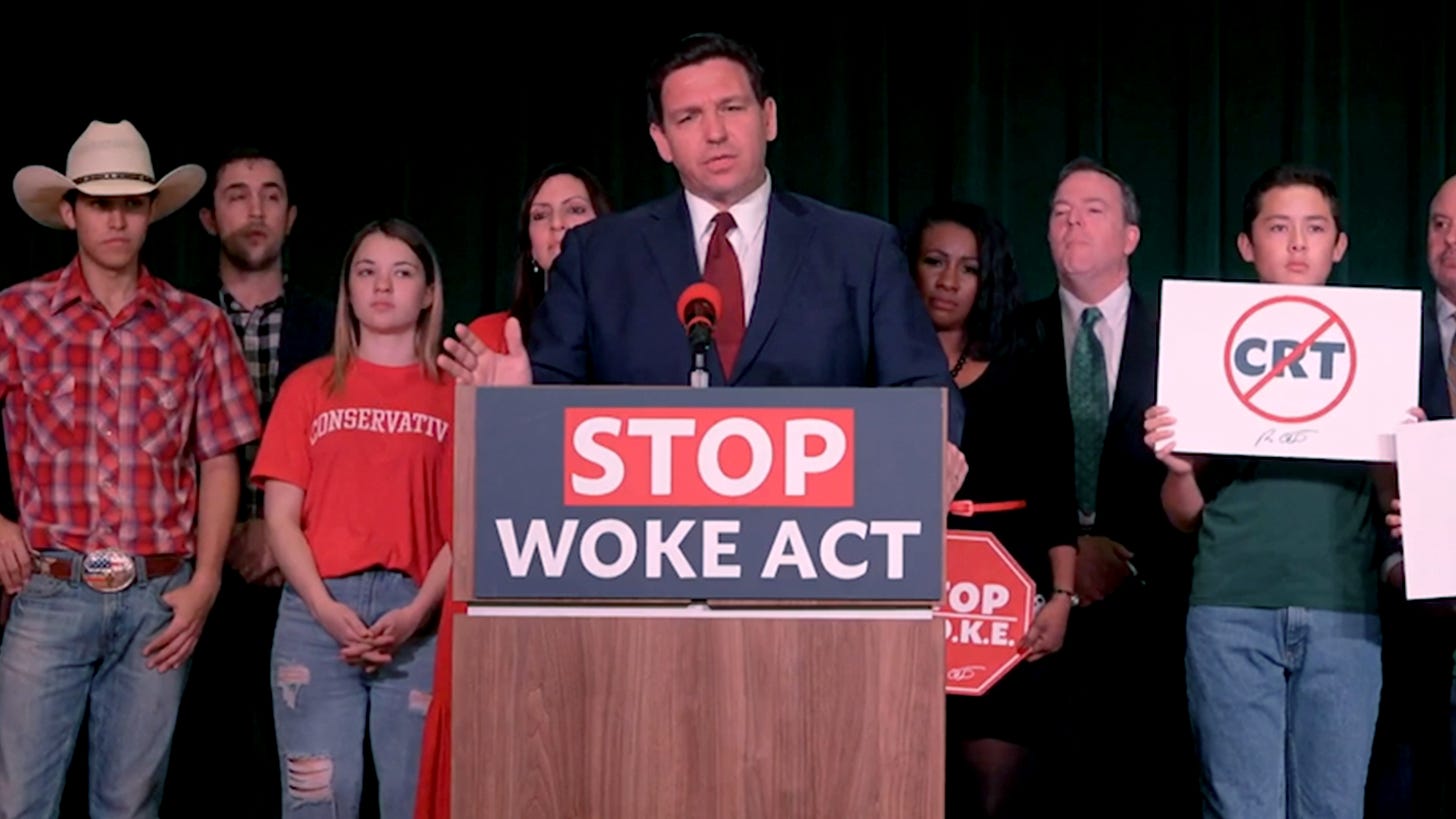The Hawley and the Ivy
Republicans are increasingly using the language of class conflict to promote right-wing populism— a choice that may shape the two major parties for decades to come.
Merry Christmas. While you all are listening to songs like “The Holly And The Ivy”, allow me to tell you about a different Hawley and a different Ivy.
I am, of course, talking about Josh Hawley, a rising star in the Republican Party. Hawley grew up the son of a banker and a teacher in Springdale, Arkansas. He graduated as the valedictorian of his private high school before attending Stanford and Yale Law School, where professors noted his academic ability and saw him as Presidential material.
Hawley is known for trying to take Republicans down a more populist direction, one that Donald Trump kicked off with the MAGA movement. Hawley was 1 of 6 Republicans to vote in support of paid sick leave for rail worker unions over a potential strike last month, which is not the only 1/6 he’s ever been a part of.
Hawley penned an essay explaining why he voted that way, titled “Which Side Are You On, DC?” that said things like
…the winners of our modern economy aren’t accustomed to thinking about where their consumer goods come from. As Biden put it last week, “10 years ago, how many of you knew what the hell a supply chain was?” The answer is: everyone who works a production job. But thanks to services like Amazon Prime and UberEats, America’s professional-managerial types inhabit a world where goods appear on their doorsteps, as if by magic.
Nor do those people spend much time considering the workers whose sweat and toil makes their lives possible—except when it comes time to lecture them about their politics, or to send reporters to gawk at them in the pages of The New York Times or The Washington Post.
The record profits of the rail industry have been a tremendous victory for Wall Street. Not so much for workers.
The reason anti-worker attitudes are so prevalent among the powerful is simple: More and more of our leaders embrace the idea that blue-collar labor is inherently low-status, even embarrassing. Today’s professional and political classes want everyone to look and act like them. Go to an expensive college. Take on five or six figures in debt. Get married late, defer having children—or don’t have them at all—and work an office job. Be a good little consumer, and don’t cause a scene.
And this formula has indeed worked, for a sliver of the population. Meanwhile, real wages for most Americans are falling, fewer Americans are getting married, fewer still are having families, and millions of able-bodied men are out of the workforce.
Wall Street and Washington say this anti-worker agenda is the natural order of things. They’re wrong, as usual. We don’t have to follow this path—and we shouldn’t a moment longer.
And yes, Hawley is a Republican: a member of the same party that nominated a private-equity CEO that said “corporations are people too” for President just a decade ago. Yet here Hawley is, railing (pun not intended) against Wall Street’s greediness.
Hawley uses phrases like “professional-managerial types”— paraphrasing a term coined by socialist activist Barbara Ehrenreich, one of the highest ranking members in the Democratic Socialists of America up until her death. Ehrenreich described the Professional Managerial Class (PMC) as “salaried mental workers who do not own the means of production and whose major function in the social division of labor may be described broadly as the reproduction of capitalist culture and capitalist class relations”. The term evokes the stereotype of the affluent college-educated socially-progressive urbanite that buys organic free-trade products at Whole Foods and has an “In This House We Believe” sign on their gentrified neighborhood door.
PMC is used as a pejorative in many Marxist and socialist spaces, and now it appears to have spread to right-wing populists as well, a fact that Ehrenreich was well aware of, as shown by her response in this interview where the interviewer name-drops Hawley:
Ehrenreich discusses just how out of touch the PMC is with the working class, so much that an editor at a liberal women’s magazine wondered if blue-collar men were even capable of independent thought. And that is the exact strain of liberal elitism and snobbery that has led to a mass exodus of workers from Democrats.
Hawley uses the “extreme gap between our media and the working class” to his advantage by channeling anti-Establishment sentiment into votes. He speaks of workers and labor and unions, a sharp contrast from when union-busting Scott Walker was a rising Republican star just a few years ago. Presidential-hopeful Walker in 2016 was absolutely pummeled by Trump and exited the race early, an early sign of what was to come. Then Trump managed to flip Walker’s home state of Wisconsin in the 2016 general election, with votes from former Bernie Sanders supporters pushing him over the edge.
There is nothing new about a politician that was born into an affluent family, educated at America’s most elite colleges, and now fashions themselves as a champion of the working class. Donald Trump, a UPenn grad that kicked off his real estate career with a “small loan of a million dollars”, rode the populist wave all the way to the White House.
It’s not just Republicans, as Democrats have already been doing this for ages. This year John Fetterman, the trust-fundie Harvard-educated son of a wealthy family, appealed to working class voters by… wearing Carhartt hoodies and shorts. It was a shameless attempt to seem relatable to working class voters: perhaps someone needs to tell him their culture is not a costume. But luckily for him, his opponent Dr. Oz, of “crudité” viral infamy, was even less relatable. (Although some of that may have been in part due to Oz’s ethnicity and religious background, a point typically-identarian PMC media refused to even acknowledge)
Politicians like Hawley, Fetterman, and Florida governor Ron DeSantis, a Yale and Harvard Law grad widely considered to be Trump’s successor, have all embraced working class populist policies and rhetoric while being affluent PMC Ivy-League grads. DeSantis crushed his Democratic opponent in a landslide in this year's gubernatorial election, where he turned many former Democratic voters into his loyalists. This was especially true among Hispanic voters, who are more likely to be working class. Piles upon piles of articles have been written about how Democrats are quickly losing ground with this fast-growing demographic, once thought to guarantee Democratic victories for the next few decades, now a harbinger of the realignment to come. DeSantis has taken a firm stand against the main ideology of the liberal elite: wokeness. DeSantis pushed his “Stop WOKE act” heavily and proclaimed that Florida was “where wokeness comes to die”, pitting what he saw as “common sense” with the values of the liberal elite.
This isn’t a surprise for anyone that’s been to an Ivy League college. America’s elite colleges are major centers of PMC reproduction, which led the populists to realize how quickly America is realigning on axes of educational attainment and social class. Hawley, Fetterman, and DeSantis all realize how elitist affluent liberals can be with their land acknowledgements, their pronoun circles, their safe spaces, their cancel culture, their talk of microaggressions, their endless virtue signaling. The populists have seen America’s liberal elite close up and realize how out-of-touch they all are, how alienating their speak and values are to pretty much anyone not like them. There’s a reason why so many words have been coined just to describe them.
In an era where neoliberal economic policies have grown increasingly unpopular, Hawley realizes the big realignment happening in American politics: as Democrats become the party of affluent college-educated people, Republicans are increasingly courting non-college-educated working class people who feel alienated by what they see as a party of elitist virtue signaling. This shift is real and palpable: Republicans see the potential and have formed think tanks like American Compass charting how to court working class voters. American Compass’s founder, Oren Cass, has written extensively about how conservatives should ditch free-market capitalism and promote a conservatism based on forging community bonds and traditional family values, one that appeals to many working class, non-college educated, and immigrant voters.
Pundits on the left have been paying attention to this shift— Jacobin in particular has covered this issue extensively, and has openly proclaimed that left-wing populism was how to get those voters back— not the racial identity politics that have failed spectacularly as people of color are increasingly voting Republican. While much of Trump’s success was claimed to be from “white rage”, Trump actually lost support from white voters compared to Romney (58% to Romney’s 59%), while he gained support with people of color, despite being tarred by the liberal elite as an incorrigible racist— showing that appeals to class are more effective than appeals to race.
Only 6 Republicans voted for that sick leave bill. The Republican Party still sees a path where it can remain a fiscally conservative party, one that loves free markets. But the Republican alliance of free-market capitalists and family-values Evangelicals has long been a tenuous one. Same with the Democratic alliance of educated socially-liberal professionals and working class socially-conservative minorities. And the numbers don’t lie: they show that working class voters are increasingly drawn to the GOP while affluent professionals are leaving. It's entirely possible that if Hawley and Co. gain more influence over the GOP, Republicans will be the party of fiscal liberalism and social conservatism, while Democrats turn into what Libertarians are now, minus the guns. Wokeness has proven to be incredibly unpopular with large swathes of Americans, and Democrats are now paying the price.
Democrats have been trying to adapt to these shifts with politicians like Fetterman, but one thing is for certain: polemics against the PMC are turning working class voters red, and it’s not the kind of red Ehrenreich was talking about.
If you enjoyed reading, check out my other essays, especially this one about the PMC.











I've come to enjoy your comments on The Free Press so I thought I'd take a look at your substack. This essay is spot on.
One quibble is are you referring to "non-college-educated working class" or "non-college, educated working class?" Because many of my friends in the trades are well read and highly educated. They just haven't been subject to the re-education camps that masquerade as universities. And, notwithstanding my education levels and apprenticeships at some elite New York City legal venues, my roots remain solidly working class, albeit with the ability to "pass." Until I express a political opinion, lol.
It doesn’t make you a Marxist to advocate for policies that help the working class. The most effective policies are smaller government, fewer regulations, less immigration, commitment to safety, and lower taxes. In other words, government should focus on making it easier for people to create businesses, be safe, and keep what they build. In absolutely no way is this the same as what Leftists advocate, and yet it is a populist message. The Right want people to succeed. The Left want people to feel envy and rage. One is about empowerment, the other about helplessness.